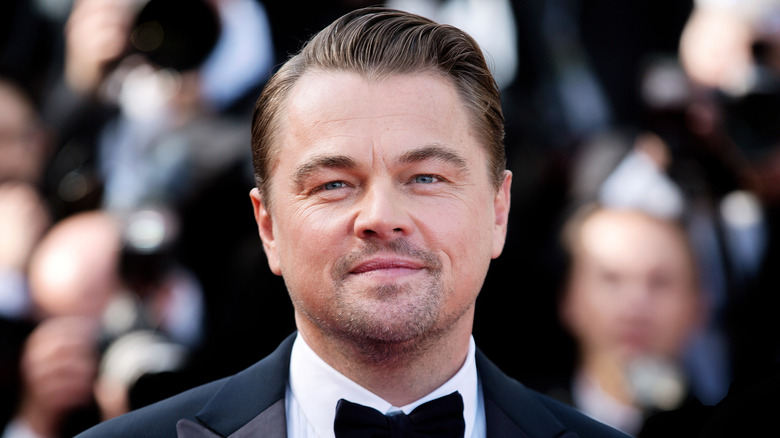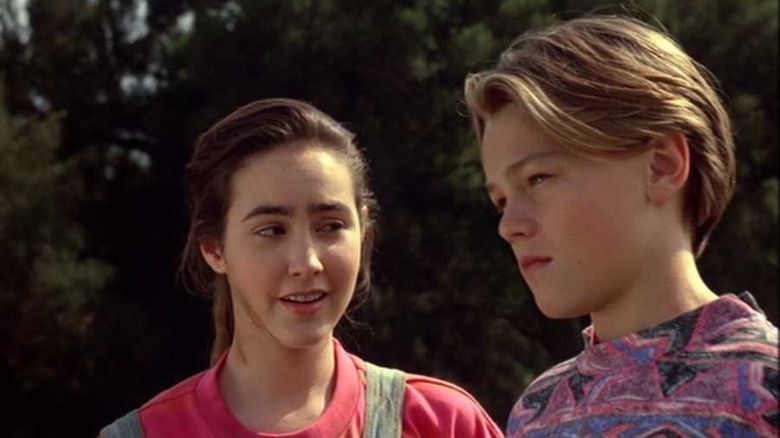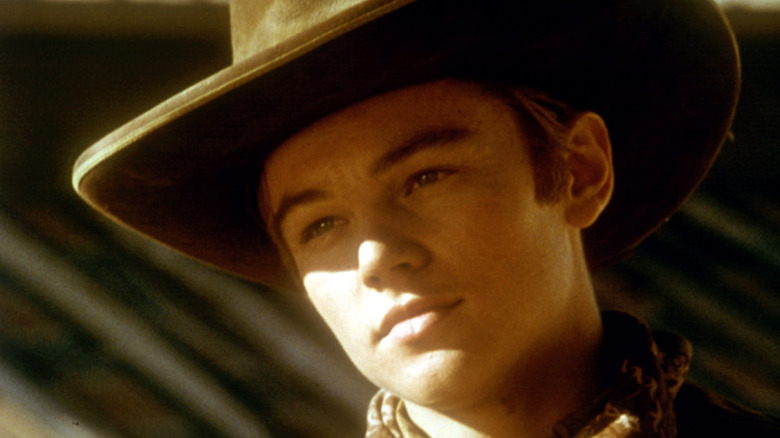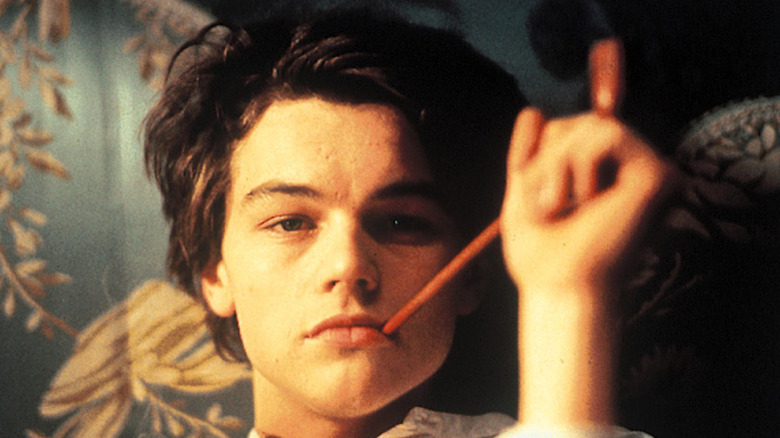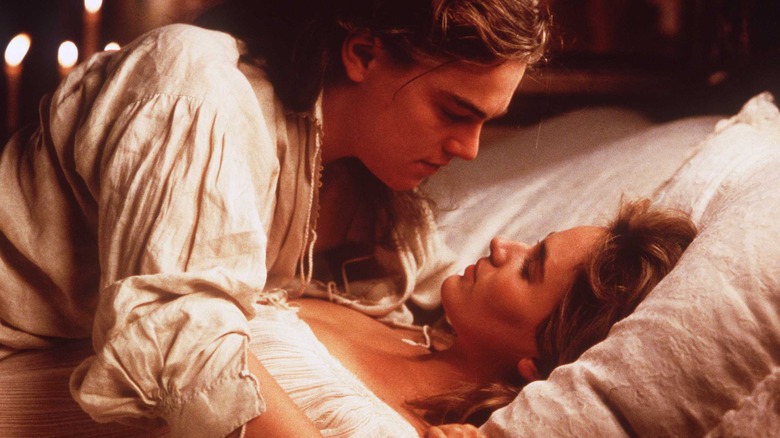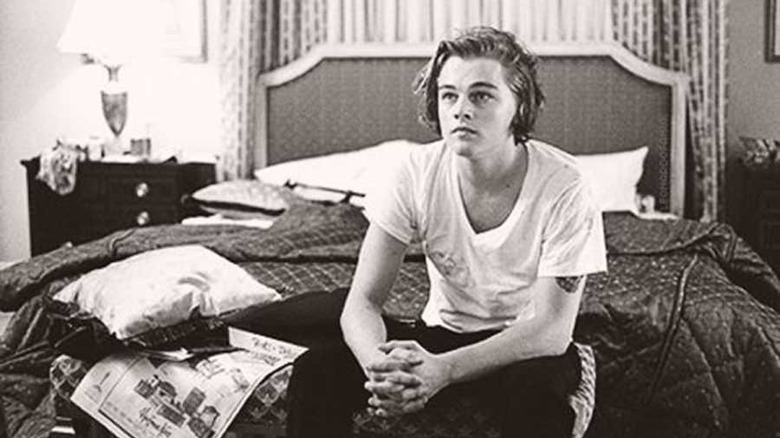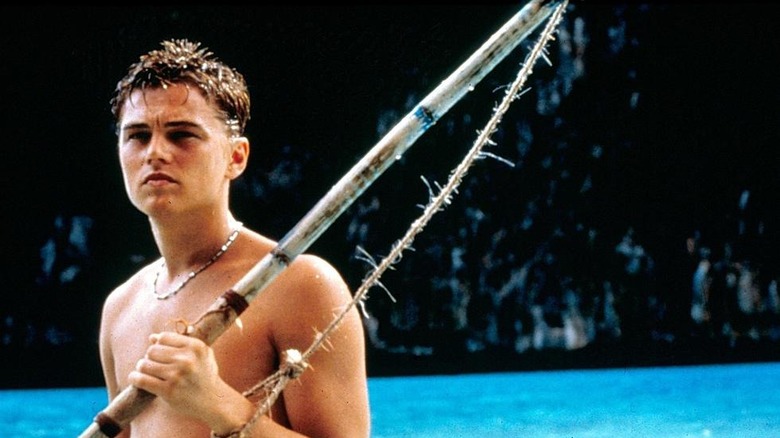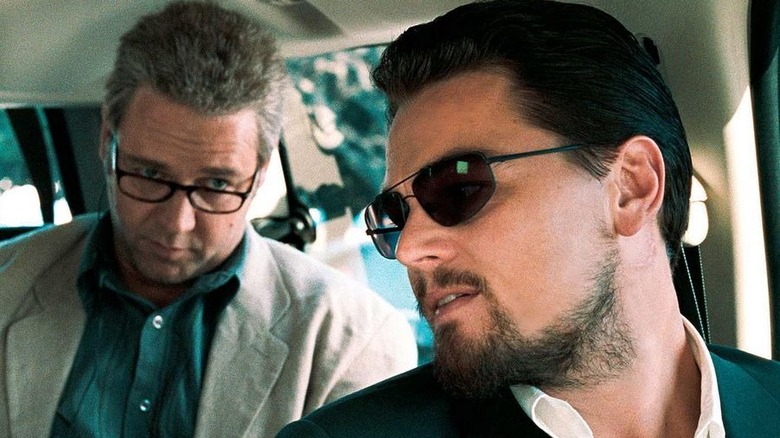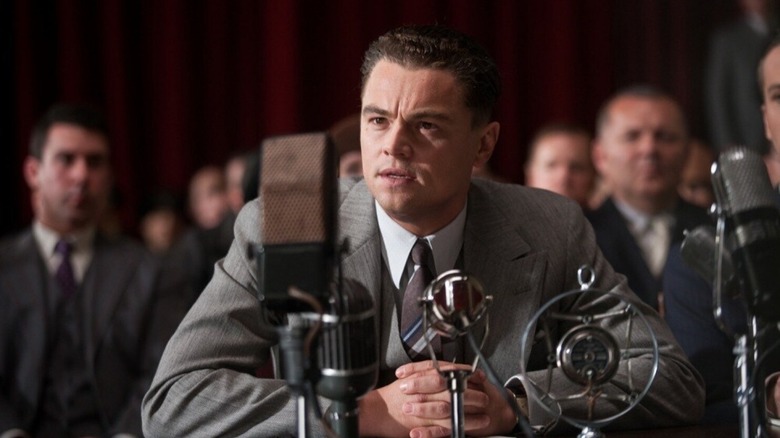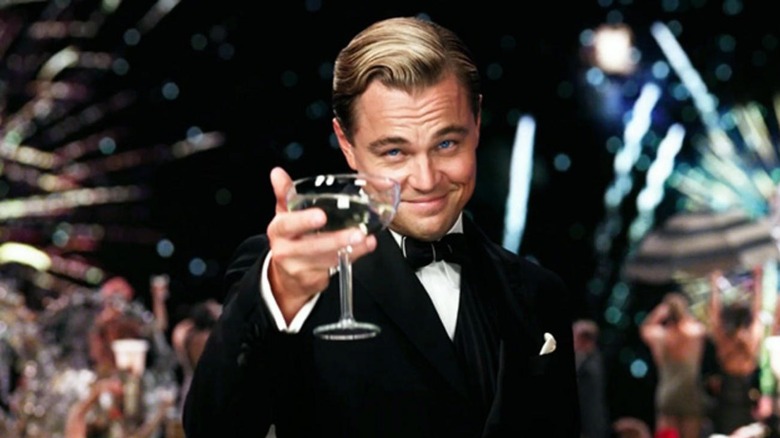Roles Leonardo DiCaprio Should've Said No To
Considering how long he's been a movie star, it's surprising how few films Leonardo DiCaprio has actually acted in. Between his motion picture debut "Critters 3" in 1991 and his Oscar win for "The Revenant" in 2015, DiCaprio only appeared in 28 films. He's often taken long breaks between roles, waiting a full four years before returning to the screen for his first post-Oscar movie, 2019's "Once Upon a Time in Hollywood." So to say he's selective is perhaps an understatement.
You can't blame him for being choosy, considering it's worked out so well for him. Over the years, DiCaprio has snagged seven Oscar nominations, including five bids in the Best Actor category ("The Aviator," "Blood Diamond," "The Wolf of Wall Street," "The Revenant," "Once Upon a Time in Hollywood"), one in the Best Supporting Actor category ("What's Eating Gilbert Grape"), and one in the Best Picture category ("The Wolf of Wall Street"). He's also cultivated relationships with A-list directors, most notably Martin Scorsese, Quentin Tarantino, Steven Spielberg, and Baz Luhrmann.
It's all been part of a calculated effort on DiCaprio's part to move from teen heartthrob to respected thespian. Yet not every decision he's made has been a good one. Perhaps he's become increasingly picky because of some missteps in his career. Even some choices that looked like surefire hits turned out to be disappointing flops. Here are a few roles Leonardo DiCaprio should've declined, from the noble failures to the outright catastrophes.
Critters 3 (1991)
In all fairness, it's understandable that Leo leapt at his first chance to appear in a movie, even if it was in a total stinker. The then-17-year-old actor had already appeared on the small screen, with roles in "Growing Pains" and "Parenthood," before finally making his way... well, in the case of the direct-to-video "Critters 3," to a slightly more prominent small screen.
This third entry in the poor man's "Gremlins" franchise finds the furry little monsters descending upon a Los Angeles apartment complex. DiCaprio plays Josh, whose stepfather, Briggs (William Dennis Hunt), is the building's corrupt landlord. Briggs gets his just deserts when Josh unwittingly locks him in a bedroom with the toothy creatures. Later, Josh joins his fellow tenants to try and stop the carnage.
Aside from that, Leo doesn't have much to do here, despite getting top billing on every subsequent home video release. The film was trashed by critics, holding a resounding 0% rating on Rotten Tomatoes. DiCaprio's movie career may have gotten off to a shaky start, but it wouldn't take long for it to stabilize. Just two years later, he was hand-picked by Robert De Niro to star opposite him in "This Boy's Life" and earned his first Oscar nomination for "What's Eating Gilbert Grape."
The Quick and the Dead (1995)
Maybe Leo has a thing for Westerns? He's flirted with the genre several times, winning his first Oscar for the pseudo-Western "The Revenant" and strapping on some spurs for the show-within-a-movie portion of "Once Upon a Time in Hollywood." But his first out-and-out cowboy movie was also one of Sam Raimi's least-heralded efforts: "The Quick and the Dead."
Sharon Stone headlines as Ellen, an 1880s gunslinger who arrives in the Old West town of Redemption packing heat and smoking a thin cigar. Ellen, aka "The Lady," is hell-bent on avenging her father's death at the hands of the evil John Herod (Gene Hackman), who rules over the town with an iron fist. She sees Herod's yearly dueling contest — in which the townsfolk shoot at each other until there's one man (or woman) left standing — as the perfect opportunity.
Also riding into Redemption is The Kid (DiCaprio), who claims to be Herod's long-lost son and enters the contest as a way of getting his attention (perhaps not the safest reunion, but sure). DiCaprio makes a convincing young gunslinger with his swagger and bluster, but to the extent that the movie succeeds, it's thanks to Raimi's rambunctious visual style, not its threadbare story and characterizations. Luckily for Leo, he also had "The Basketball Diaries" out that year to continue his star-making trajectory.
Total Eclipse (1995)
Perhaps the most forgotten title in Leo's filmography, "Total Eclipse" also comes with one of the toniest pedigrees of the actor's early career. Helmed by acclaimed director Agnieszka Holland ("Europa, Europa," "In Darkness") and adapted by two-time Oscar winner Christopher Hampton ("Dangerous Liaisons," "The Father") from his own play, it's got all the trappings of an important drama bound for awards glory. So what went wrong?
Well, as critics at the time put it, this retelling of the torrid love affair between 19th-century French poets Paul Verlaine (David Thewlis) and Arthur Rimbaud (DiCaprio) gets all the period details right, but none of the passion. And, as Roger Ebert pointed out, it doesn't help when the lead characters are depicted as "unpleasant, sniveling, monstrous, egotistical, and annoying." Yikes!
It's challenging subject matter; the 27-year-old Verlaine went to prison on sodomy charges for sleeping with the 16-year-old Rimbaud and was often sadistically abusive towards his young wife, Mathilde (Romane Bohringer), while subjecting himself to the mistreatment of his lover. After Verlaine's imprisonment, the similarly sadomasochistic Rimbaud died from a tumor in his right knee at the age of 37. You'd think all of this would at least make for an entertaining soap opera, but alas, it's presented with all of the emotional intensity of watching soap get manufactured.
The Man in the Iron Mask (1998)
Hot off the heels of starring in the global phenomenon that was "Titanic," Leo tried his hand at another period adventure with this ambitious retelling of Alexandre Dumas' classic tale. While "The Man in the Iron Mask" hopes to be a throwback to the swashbuckling days of Errol Flynn, it ends up as little more than an overly serious, too-long mess with none of Flynn's flair.
You can certainly see the appeal to DiCaprio, who plays a dual role as both the evil King Louis XIV and his brother, Philippe Bourbon, the titular man in the iron mask. King Louis keeps his brother locked away so as not to threaten his seat on the throne. It's up to the four musketeers (Jeremy Irons as Aramis, John Malkovich as Athos, Gérard Depardieu as Porthos, and Gabriel Byrne as D'Artagnan) to spring Philippe from prison in the hopes of pulling a royal switcheroo.
The young DiCaprio has fun as the villainous king, a petulant brat who feasts while the people of Paris starve. But this is really just a warmup for his vastly superior turn as plantation owner Calvin Candie in "Django Unchained." Critics were harsh, and the film won DiCaprio not that coveted first Oscar, but that dreaded first Razzie for Worst Screen Couple (because, you know, he played twins).
Celebrity (1998)
For a while, there was no more coveted job for an actor than a role in a new Woody Allen film. Stars would drop everything to show up, even if it was just for a few lines of dialogue. At the height of his growing popularity, DiCaprio took on a small supporting role in Allen's Hollywood satire. He's essentially playing a version of himself. Given the end results, his time might've been better spent elsewhere.
"Celebrity" stars Kenneth Branagh as... well, as a Woody Allen stand-in. He's technically playing Lee Simon, a failed novelist turned entertainment journalist having a midlife crisis after he splits from his wife (Judy Davis). He roams around the world of actors, models, and singers "La Dolce Vita"-style, always pitching his screenplay, desperate to be more than just a hanger-on.
Along the way, he encounters Brandon Darrow (DiCaprio), a self-centered movie star who wreaks havoc wherever he goes. Brandon indulges in typical bad boy behavior: trashing hotel rooms, manhandling his girlfriend (Gretchen Mol), and giving Lee notes on his script. Even reviewers like Roger Ebert, who panned the movie, praised DiCaprio as being the best thing about it. Others were not so kind, finding little to herald other than Sven Nykvist's gorgeous black-and-white cinematography.
The Beach (2000)
DiCaprio's quest for legitimacy through working with important filmmakers led him to Danny Boyle, fresh off his early triumphs of "Trainspotting" and "Shallow Grave." Unfortunately, "The Beach" was made during Boyle's struggle to adapt his kinetic style to the Hollywood studio system, and the results are a low point for both the director and star.
Based on the novel by Alex Garland ("Ex Machina," "Annihilation"), it's a sort of Gen X "Blue Lagoon," with Leo playing an American traveler in Thailand who learns of a secluded island paradise from a fellow ex-pat (Robert Carlyle). He travels with a French couple (Virginie Ledoyen and Guillaume Canet) to the beach, where they encounter a tribe of cannabis farmers overseen by the enigmatic Sal (Tilda Swinton). A love triangle ensues, as well as a curious set piece when Leo imagines he's the lead character in a video game.
Bad reviews aside, the film caused significant controversy over environmental lawsuits alleging the production significantly damaged the island location's ecosystem (the suits were eventually settled, although the beach was closed to tourists after further damage). This should be reason enough for an avowed environmentalist like DiCaprio to regret his participation. "The Beach" was also a temporary setback in his quest for critical validation, earning him a Razzie nomination for Worst Actor. Thankfully, his career rebound was right around the corner with major roles in films by Steven Spielberg ("Catch Me If You Can") and Martin Scorsese ("Gangs of New York").
Body of Lies (2008)
DiCaprio has sought out collaborations with acclaimed directors throughout his career, most notably Martin Scorsese, Steven Spielberg, and Quentin Tarantino. So it's little wonder he would jump at the chance to work with Ridley Scott. Yet even the best filmmakers can't hit one out of the park every time. This mid-level CIA thriller is far from the career heights of "Alien" or "Blade Runner."
Don't get us wrong: There's a lot to like about "Body of Lies." This being a Ridley Scott production, you know it's at least going to look good. And with a 55% Rotten Tomatoes rating, it's certainly got its fans. But the lion's share of acclaim went to Scott's visual stylings, while the bulk of criticism went to the muddled story and paper-thin characterizations.
The plot: Leo is a CIA agent on the hunt for a terrorist in the Middle East. While tracking the elusive target, he finds himself navigating conflicting motives from his American supervisor (Russell Crowe) and the head of Jordanian Intelligence (Mark Strong). It's a sort of Jason Bourne for current events, with Leo trying to keep his cool amid the fireworks. He comes out pretty unscathed despite the film's middling reception. In fact, that same year he earned a Golden Globe nomination for "Revolutionary Road," which reunited him with his "Titanic" co-star Kate Winslet, so 2008 wasn't a total bust.
J. Edgar (2011)
As with many of DiCaprio's bad choices, on paper, this one seems like a sure bet. After all, Clint Eastwood has a good track record directing actors to Oscar nominations (and often wins), and at this point in his career, DiCaprio was almost singularly focused on clinching that elusive first victory. The fact he'd be playing a real historical figure — one of the most notorious figures of the 20th century at that — certainly helped. Unfortunately, Leo happened to pick one of those Eastwood misfires that pop up from time to time.
"J. Edgar" holds a mixed 43% Rotten Tomatoes rating). Its detractors point to its muddled themes, confusing narrative, and questionable old-age makeup. The film jumps back and forth in time to tell the story of J. Edgar Hoover's rise to power in the newly formed FBI, and how his insecurities and paranoia led him to abuse that power. The script, by Oscar-winner Dustin Lance Black ("Milk"), touches upon the rumors surrounding his relationship with Clyde Tolson (Armie Hammer), a handsome agent who accompanied him everywhere and later inherited his estate.
The cherubic DiCaprio seems an odd match for the famously pug-faced Hoover, even with the help of extensive makeup that becomes more plastered as he ages. Despite the film's so-so debut, DiCaprio came within an inch of reaping an Oscar nom after receiving Best Actor bids at the Golden Globes and SAG Awards. Unfortunately, he would have to wait a little while longer to finally join the winner's circle, as "J. Edgar" laid a complete goose egg on nominations day (a rarity for an Eastwood movie at that time).
The Great Gatsby (2013)
Perhaps the most polarizing pick on this list, "The Great Gatsby" has both its ardent fans and vehement critics. It's little wonder DiCaprio would want to reunite with Baz Luhrmann, the director who helped turn him into a heartthrob with his punk rock version of "Romeo + Juliet." But was it a good idea for the two to tackle F. Scott Fitzgerald's Jazz Age classic?
First, the good: Luhrmann's fervent camerawork and lavish stylings transport audiences back to the Roaring '20s. The film's Oscar-winning costumes and production design (courtesy of Luhrmann's wife, Catherine Martin) are as eye-popping as you would expect from the man who made "Moulin Rouge!," capturing the decadence of American elites in the days before the stock market crashed. And the soundtrack — featuring a number of hip-hop tunes courtesy of executive producer Jay-Z — is just as propulsive and evocative as the song scores to Luhrmann's previous films.
The film's energy is cranked to the max, and that extends to the performances, which are histrionic, to say the least. DiCaprio gives it his all as Jay Gatsby, a millionaire playboy yearning for his lost love Daisy (Carey Mulligan). This would seem like perfect material for Luhrmann — a romantic if ever there was one — but the story's beating heart is often lost under the weight of all that period jewelry. Although "Gatsby" was a minor disappointment for Leo, he did earn double Oscar nominations for producing and starring in his second 2013 release, "The Wolf of Wall Street."
